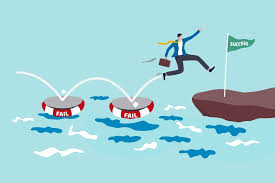List Of Contents
- 1 Understanding Personal Failure
- 1.1 Emotional Impact of Failure
- 1.2 The Role of Resilience
- 1.3 Lessons Learned from Failure
- 1.4 Overcoming the Fear of Failure
- 1.5 The Growth Mindset and Failure
- 1.6 Success Stories Rooted in Personal Failure
- 1.7 Practical Strategies for Embracing Failure
- 1.8 Turning Failure Into Strength
- 1.9 Conclusion Personal Failure
- 2 Author
Personal failure is an experience almost everyone encounters at some point in their lives. It might be in the form of a failed relationship, a missed career opportunity, an unsuccessful project, or even the inability to achieve a personal goal. While failure can be painful and often embarrassing, it is also an essential part of growth and self-discovery. This article explores the nature of personal failure, its impact on individuals, and how it can serve as a powerful catalyst for growth and resilience.
Understanding Personal Failure

Failure is often perceived as a negative outcome that reflects poorly on an individual’s abilities or character. However, personal failure is better understood as a natural part of life’s learning process. It is not the failure itself that defines a person, but how they respond to it.
Personal failure can stem from various sources, including external circumstances beyond one’s control or internal factors such as poor planning or lack of effort. Regardless of the cause, failure provides an opportunity to reassess goals, strategies, and attitudes. It challenges individuals to confront their vulnerabilities and develop a deeper understanding of their strengths and weaknesses.
Emotional Impact of Failure
The experience of failure can evoke a range of emotions, from disappointment and frustration to shame and self-doubt. These feelings are natural and often necessary for processing the situation. However, unchecked negative emotions can lead to long-term consequences, such as a diminished sense of self-worth or fear of trying again.
Managing the emotional impact of failure involves acknowledging these feelings without allowing them to dictate future actions. Journaling, talking to a trusted friend, or seeking professional guidance can help individuals process their emotions constructively.
The Role of Resilience
Resilience plays a critical role in how individuals handle personal failure. Resilience is the ability to recover from setbacks, adapt to adversity, and move forward with renewed determination. People with high resilience are not immune to failure, but they are more likely to view it as a temporary obstacle rather than a permanent defeat.
Building resilience requires cultivating a positive mindset, practicing self-compassion, and maintaining a focus on long-term goals. Resilient individuals are often better equipped to learn from their failures and turn them into stepping stones for success.
Lessons Learned from Failure
Every failure carries valuable lessons that can shape future actions and decisions. These lessons often include insights about what works, what doesn’t, and how to approach challenges more effectively. For instance, failing to secure a job might highlight areas where additional skills or preparation are needed, while a failed relationship could reveal patterns of communication that require improvement.
Reflecting on failure involves asking critical questions: What went wrong? What could have been done differently? What factors were within my control? Answering these questions honestly can provide a roadmap for personal and professional development.
Overcoming the Fear of Failure

One of the greatest barriers to growth is the fear of failure. This fear can prevent individuals from taking risks, pursuing their dreams, or stepping outside their comfort zones. Overcoming this fear involves shifting the perspective on failure from something to avoid to something to embrace.
Reframing failure as a learning opportunity requires changing one’s internal narrative. Instead of viewing failure as evidence of incompetence, it can be seen as proof of effort and a willingness to take risks. Celebrating small successes along the way can also build confidence and reduce the fear of failing.
The Growth Mindset and Failure
Adopting a growth mindset is essential for transforming personal failure into growth. A growth mindset, as opposed to a fixed mindset, views abilities and intelligence as qualities that can be yowestogel developed through effort and learning. People with a growth mindset are more likely to see failure as an opportunity to grow rather than a reflection of their limitations.
Cultivating a growth mindset involves embracing challenges, persisting in the face of setbacks, and appreciating the value of effort. It encourages individuals to focus on the process of learning and improvement rather than solely on the outcome.
Success Stories Rooted in Personal Failure
Many of the world’s most successful individuals have experienced significant failures on their journey. From business leaders and inventors to artists and athletes, their stories demonstrate that failure is not the end but often a pivotal moment in the pursuit of greatness.
For example, Thomas Edison, the inventor of the light bulb, famously remarked that he had not failed but found 10,000 ways that didn’t work. Similarly, J.K. Rowling faced multiple rejections before her Harry Potter series became a global phenomenon. These stories remind us that failure is not an endpoint but a stepping stone toward achievement.
Practical Strategies for Embracing Failure

Embracing failure requires practical strategies that promote self-reflection, learning, and resilience. Some of these strategies include:
- Reframing Failure: Viewing failure as feedback rather than a setback can help individuals see its value in the learning process.
- Setting Realistic Goals: Unrealistic expectations can lead to unnecessary failures. Setting achievable goals ensures steady progress and reduces the likelihood of discouragement.
- Celebrating Effort: Recognizing and celebrating effort, regardless of the outcome, reinforces the importance of trying and learning.
- Seeking Support: Surrounding oneself with supportive individuals can provide encouragement and perspective during challenging times.
- Practicing Self-Compassion: Being kind to oneself after a failure fosters a healthier relationship with personal growth.
Turning Failure Into Strength
The ability to turn failure into strength lies in the mindset and actions taken after the experience. Reflecting on failure, identifying areas for improvement, and taking proactive steps toward growth are crucial in transforming setbacks into strengths.
Personal failure often reveals untapped potential, resilience, and creativity. It challenges individuals to rise above their circumstances, develop new skills, and approach life with a renewed sense of purpose.
Conclusion Personal Failure
Personal failure is an inevitable part of life, but it is also a powerful teacher. By embracing failure as an opportunity to learn and grow, individuals can transform setbacks into stepping stones toward success. Cultivating resilience, adopting a growth mindset, and reframing failure as feedback are essential steps in this journey. Ultimately, it is not the absence of failure but the willingness to face it with courage and determination that defines true success.

